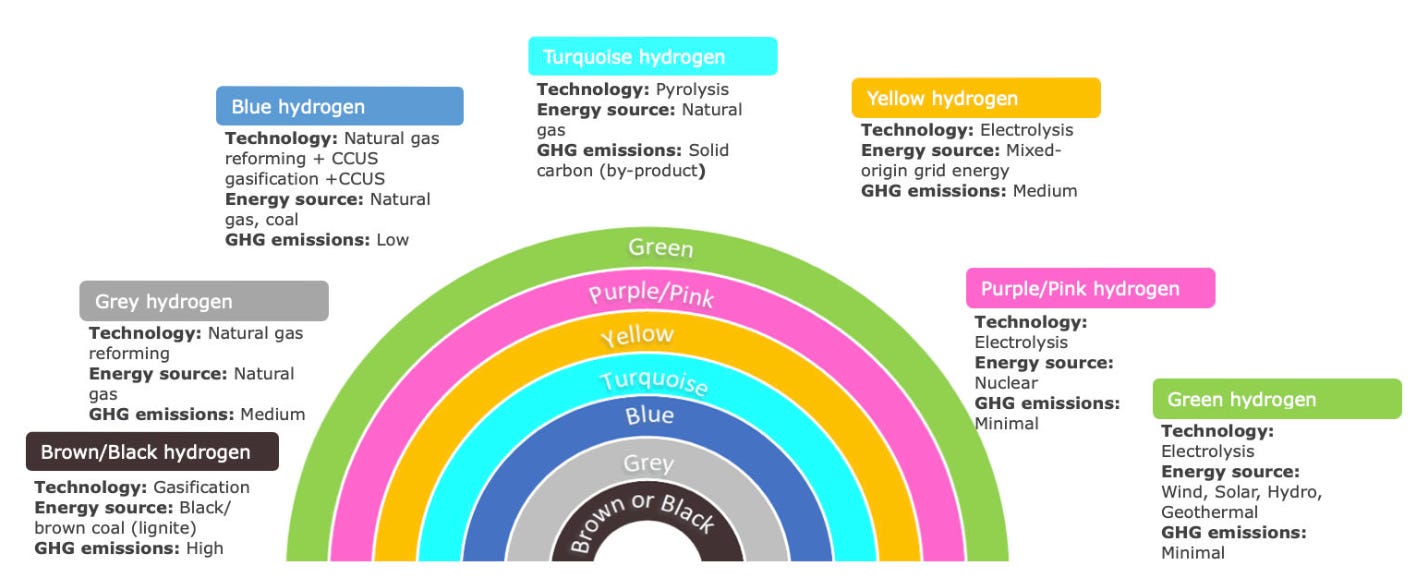#08 Green Hydrogen
A really versatile clean fuel that will be key to decarbonize the economy
Read time: 3 minutes
In this week’s issue you will learn about a fuel that will be necessary in the decarbonization of many sectors: Green Hydrogen
“While hydrogen applications provide comparatively small total emission reductions by 2030 in the Net Zero Scenario, they play a fundamental role in sectors where emissions are hard to abate” - International Energy Agency
Top Green Hydrogen News 🗞️
Green hydrogen cheaper than natural gas: Due to the European energy crisis green hydrogen has become cheaper than LNG (liquified natural gas) and more investment is being made.
Largest green hydrogen projects in 2022: Many more projects are being built around the world.
Let’s dive in 🧠
Hydrogen is very rarely found freely in nature, it’s usually combined with other elements. The best example is water, H2O.
That’s why the most common way to produce green hydrogen is through electrolysis.
It’s a process where you split H2O into hydrogen and oxygen by using electricity.
If the electricity used comes from renewables you get green hydrogen. But hydrogen is not always produced this way. The color changes depending on how clean the way to produce hydrogen is. That’s where the hydrogen rainbow comes in.
The vast majority of it today comes from using natural gas (grey hydrogen). And only about 1% of total hydrogen production was green in 2021.
Let’s focus on green hydrogen.
Why is it so important?
The sweet spot for green hydrogen is where electricity will not be able to provide the solution. For example:
Heavy transport ships and long distance flights: For these it’s not feasible to use batteries, instead we can use fuel cells which are basically batteries running on hydrogen and oxygen.
Steel production: Check out what I wrote about that here.
Fertilizer: We use a lot of it. To make it we need hydrogen and ideally that hydrogen should be green.
Here’s a great way to visualize the whole green hydrogen process.
So yes, green hydrogen is an awesome way to decarbonize several sectors.
It’s really versatile and it can be stored, which is great to use it as a fuel and it can also be turned into products derived from hydrogen such as ammonia and methanol.
And water is the only byproduct of using green hydrogen!
But it has some issues…
Cons
Storage: Lots of storage needs to be built. Hydrogen has a low energy density. You need about 3 times as much space to store the same amount of energy compared to natural gas.
Renewables are scarce: Using them to make hydrogen instead of using them directly might not be the best option.
Price: Electrolizers are still expensive but they are getting cheaper.
Top Green Hydrogen Companies 💰
All the major energy companies like Enel, Iberdrola, Orsted, etc. are getting into green hydrogen projects.
Besides there are many startups working on green hydrogen solutions. Here are some:
ZeroAvia: Founded in 2017 and based in the US. They make planes that can fly with hydrogen.
Elogen: Founded in 2014 and based in France. Providing green hydrogen solutions in mobility, power-to-gas, power-to-power and industry.
Octopus Hydrogen: Founded in 2017 and based in the US. They take care of the whole cycle, hydrogen production, storage, delivery, and dispensing.
❗Extreme knowledge area❗
Green hydrogen 2022 status report: This report by the International Energy Agency gives a great overview of the business, policy and tech aspects. Includes great graphs as well.
Green hydrogen coalition: A non-profit focusing on education, coalition building, and market development for green hydrogen. Lots of cool projects, resources, events, and more.
The EU’s hydrogen strategy: Really interesting for those interested in policies and projects in the EU.
That’s it for today, 1 climate tech topic in under 5 minutes.
Next week… Geothermal Energy!
If you enjoyed today’s issue, the best compliment you could pay me would be to share it with one person who you think would benefit from it :)










Very interesting article! Another important aspect I recently stumbled upon is the global warming potential of H2. While it is not a GHG itself, leakage of H2 nonetheless poses a problem as it inhibits the decomposition of methane (Source: https://acp.copernicus.org/articles/22/9349/2022/)
It's still a new field of research but if the estimates turn out to be roughly right, it highlights the importance of doing hydrogen right (green and without any leakage) or not at all.